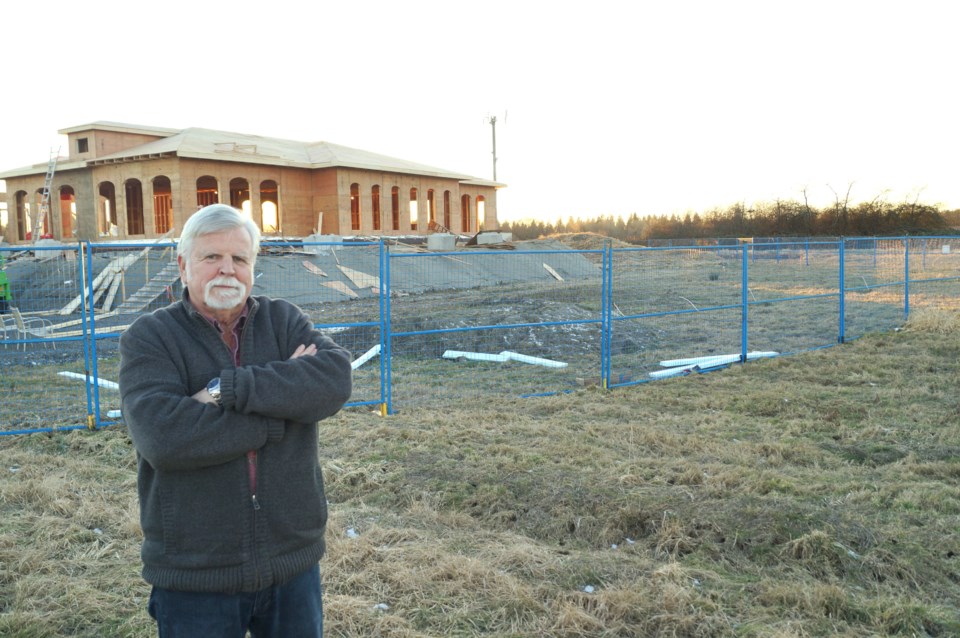Dear Editor,
I attended the city council meeting last week, wherein most elected members chose to hold a public consultation before proceeding with house-size limiting bylaws on farms.
We can debate and consult on this until the cows come home, but I guarantee that the cows are not coming home this time, because the owners forgot to build a barn into their speculative land dreams. The cows are not coming home, because there is just a seven-car garage instead, for the Maserati, the Porsche, the Bentley, or for the hotel guests.
These are not farmhouses. We are being taken for fools by the ultra-rich. Taxing won’t work because some owners do not even need the tax break because money is not an issue. They are too wealthy to effectively tax.
Nonetheless, now you, the public, can have your say. So, stand up and be counted and help put a stop to this land-gobbling craze when the consultation happens in a month.
Several presenters at last week’s meeting spoke persuasively and emotionally, from direct experience, or with facts and figures, regarding the misuse of fertile agricultural land for homes/yards with excessively large footprints. Many spoke mournfully of having witnessed the changing farmscape over decades of loss. A few defended the large, non-farm-use buildings for extended families.
Some addressed the inability of farmers to find leasable land, let alone being able to afford buying it. Farmland is not affordable for those wanting to get into farming these days, as the speculation-driven “real-world” market is pushing up farmland costs. As one woman at Monday’s meeting mentioned, some owners don’t allow lessees to raise livestock. No livestock…on “farmland?” Maybe we should start calling it “Farmlandland,” or “Virtual Fantasy Farmland” as if to say: it looks like farmland, but it doesn’t smell or function like farmland. Anyone who eats food can tell us that eating is one of the few activities left that cannot be done virtually.
Let’s not forget history: We are extremely fortunate that, in spite of the prior losses of farmland on these fertile islands we call Richmond (ground zero for topsoil lost to development), some wise provincial leaders saw the necessity of creating the Agricultural Land Reserve in 1973, during a brief but crucial window of progressive land-use thinking and lawmaking. Subsequent governments have seen fit to keep this idea and most of this land intact.
However, land speculators, including the Port of Vancouver, are now sitting on a lot of this land, having acquired it when the guards were down. Their aspiration is simple: Wait it out or lobby levels of government until “their” land is freed up for further development/subdividing/industrialization.
Thus a lot of the massive “farmhouses” we see are just placeholders for the day that I hope will never come; that is, if we the citizens are vigilant to protect what little is left of the best farmland in the province.
The volume of that farmland is already severely compromised, having been signed over to development almost 60 years ago. It is interesting to consider, if that latter error had not happened, most of us would not be living here. Perhaps we would instead be living in a much denser Vancouver, eating a lot more local food, and gazing onto the green Richmond flats at market gardens and pasturing animals. Looking at the map of Canada, it is easy to see that B.C. is mostly mountains — the province least-equipped to feed itself, should the day ever come when, for whatever unforeseen cause, we can no longer import 95 per cent of our food from thousands of miles away.
We have reached and surpassed “peak topsoil.” And we are still growing in population. In spite of what the property speculators, technocrats and industrializers of farmland would have us believe, I would argue that fertile topsoil and clean water are the two most essential land commodities for humanity’s survival.
We can live without cars. We can live without the Internet, but we can’t live without food.
These are worst-case scenarios to be sure, but these are the scenarios we must consider with regard to food security. All great civilizations thrived and or collapsed according to the availability of local food. Just because the present food system has, for now, displaced the need for comprehensive local agriculture, we are not immune to famine. We are no different from the “great” civilizations before us.
Glen Andersen
Richmond
(Editor’s note: For the full letter, go online at Richmond-News.com)



